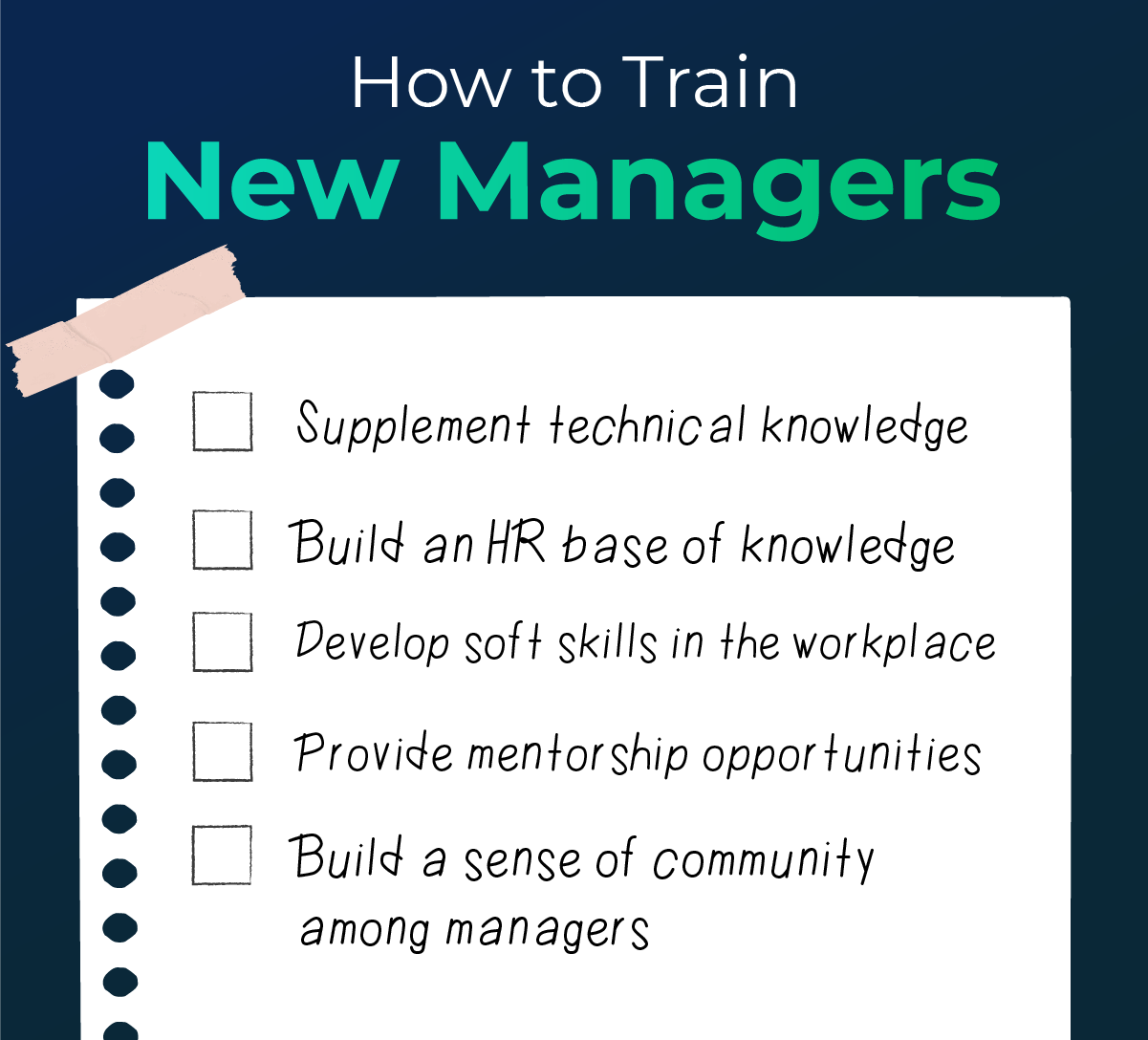How to Train Managers in Your Organization and Why It’s Important

Spend any time in the workforce, and you’ll understand that your manager can make all the difference between a positive, growth-oriented job experience and a stressful, negative one. And of course, management has an immense impact on the success of a business. Yet all too often, companies offer little or no training to their managers, even if it’s their first time in a supervisory role.
The costs of this oversight can be severe—so savvy companies are investing in manager training to improve workplace culture and company performance.
Why the Training of Managers Is Important
Managers are the backbone of an organization, responsible for both developing and applying sound business strategy and ensuring that the day-to-day work of the company gets done. Yet most managers end up in their role because they excelled as individual contributors—not because they have specific managerial qualifications.
In fact, a 2016 survey found that 87% of middle managers wish they had received more training when they became a manager, and 98% believed employee morale and retention would improve with increased training of managers. And those numbers don’t just reflect a crisis of confidence. According to Gallup, only 18% of managers demonstrate a high level of talent for managing others.
That lack of preparation has real costs. A 2019 report from the Society for Human Resource Management found that 58% of employees who quit a job due to workplace culture blamed their managers and that those departures had cost the economy $223 billion in the previous five years. That figure doesn’t even begin to touch the uncountable profits companies miss out on due to underperforming managers and unengaged staff.
So how can companies avoid these losses? By investing in training managers at every level.
How to Train New Managers: 5 Strategies
No matter how talented an employee is in an independent contributor role, management is a whole new ballgame. After all, new managers must make a major shift from focusing on their own performance to that of their team. To best support them, companies should take a multifaceted approach to leadership development. This should utilize internal resources, mentorship, and external resources to build the new skills they need. Read more about the top leadership skills for managers.

1. Supplement Technical Knowledge
Even if new managers are deeply familiar with their functional area, they likely lack a high-level view of the company’s operations. New managers should receive internal training and resources acclimating them to:
- The nuances of the company’s business model and revenue drivers
- The company’s goals and strategy, and current progress toward those goals
- Revenues and expenses, especially those relevant to their area
- Company-specific processes and strategies
- Company messaging and marketing strategies
2. Build an HR Base of Knowledge
Managers certainly aren’t expected to take on the human resources function. However, to effectively manage their reports, they need a foundational understanding of the legal and policy considerations that will impact their decision-making, delivered either via internal resources or external training. These include:
- Relevant laws regarding Occupational Safety and Health Administration (OSHA), wages and hours, and leave
- Company policies related to salaries and benefits
- Processes and procedures such as annual performance reviews
- Company policies on handling conflict or underperforming employees
- Hiring practices and processes
3. Develop Soft Skills
While technical skills are invaluable, soft skills in the workplace are often more important to a manager’s ultimate success in today’s complex and rapidly-changing working world. Unfortunately, they’re also much more difficult to impart.
Effective manager training programs, whether they are delivered by the company or external experts like Emeritus, can help build these abilities through targeted learning opportunities as well as one-on-one guidance. The most critical soft skills for managers include:
- Communication
- Conflict management
- People management
- Teamwork
- Decision-making
- Goal-setting
- Delegation
- Empowerment
- Empathy
- Flexibility
New managers will naturally be stronger in some of these areas than others. For example, delegation can be a particularly challenging area for those who have only ever worked independently—especially if they’re suddenly managing their former peers.
Similarly, providing candid, actionable feedback to direct reports can be daunting. A new manager’s superiors should work closely with them to identify areas of concern and provide resources to address weak areas.
4. Provide Mentorship to Train Managers
Management can be a lonely job—and new managers may lose their prior support networks of work peers when they’re promoted. Therefore, it’s essential to intentionally build relationships and networks to provide the feedback and firsthand knowledge they need.
For many companies, this support comes through a formal or informal coaching or mentorship relationship. Ideally, coaches bring a strong understanding of the company culture as well as its managerial practices and can offer specific advice on handling challenges that may arise. New managers should plan to check in with their mentors on regularly until they feel confident in their role and to maintain lines of communication after that.
5. Build a Sense of Community Among Managers
Periodic meetings for managers across the company are also a great tool. By carving out time for employees with similar roles and challenges to share their concerns and strategies, the company not only provides managers with a valuable sounding board but also a chance to build community and find support.
How to Train Existing Managers
Just because a manager has been on the job for a while doesn’t mean they won’t benefit from some extra training. While existing managers won’t need to be trained from the ground up, regular check-ins and periodic upskilling will help keep them engaged and at the top of their game.
Like new managers, existing managers will likely find value in connecting with others in similar roles. This can be through regular manager meetings, a dedicated Slack channel, or even a periodic lunch outing. These relationships will help prevent the isolation that can lead to burnout.
Existing managers also need an outside perspective on their work to keep them on track and help identify potential problems before they become serious. Instead of focusing solely on whether a manager’s team met its revenue targets, the manager’s supervisor should integrate a review of their leadership success into annual reviews and other assessments. Tactics for conducting this assessment could include speaking with or surveying the manager’s reports (on a confidential basis) and considering factors such as turnover in their group and their direct reports’ individual success.
Implement Manager Training with Emeritus
While one-on-one coaching and company-specific training belong in-house, many companies have not built successful programs for upskilling and reskilling new managers. Providing employees with dedicated time for study and investing in a high-quality, evidence-based program will pay dividends in developing more successful and prepared managers.
Emeritus courses are designed and delivered in partnership with leading universities to deliver actionable education grounded in the latest research. Our leadership courses for managers will set them up for success, whether they’re at the start of their managerial career or in the midst of it.
Emeritus works with corporations and organizations to provide highly targeted managerial training that addresses their specific needs and pain points. Schedule a meeting with our Enterprise group to discuss our process for creating a customized online employee training program.


